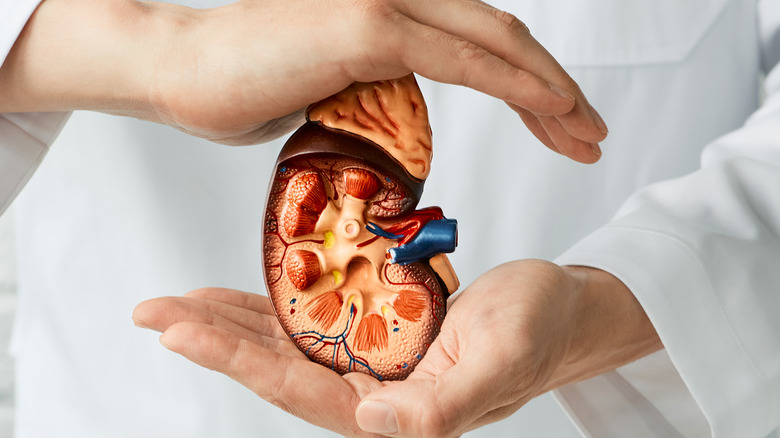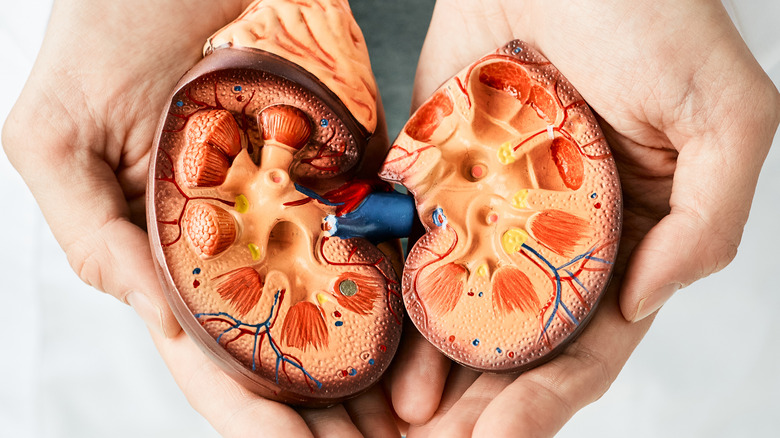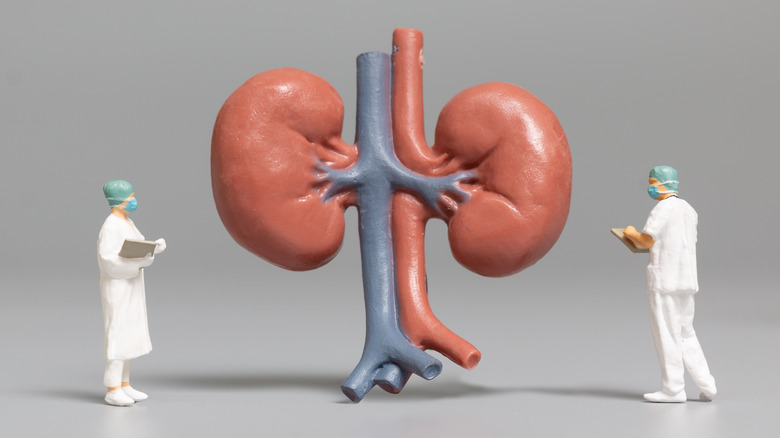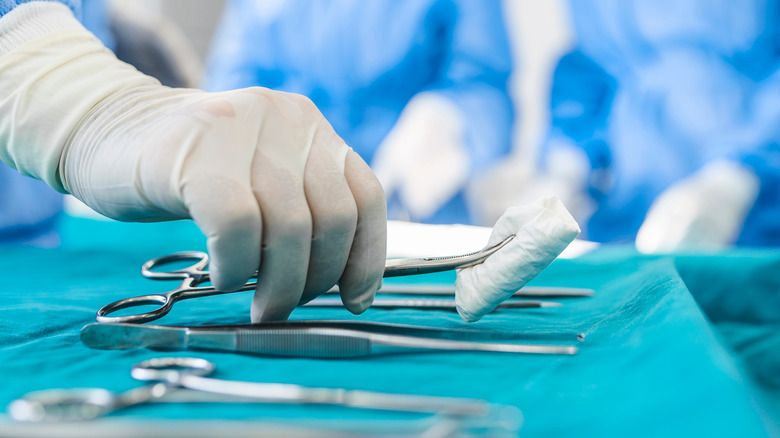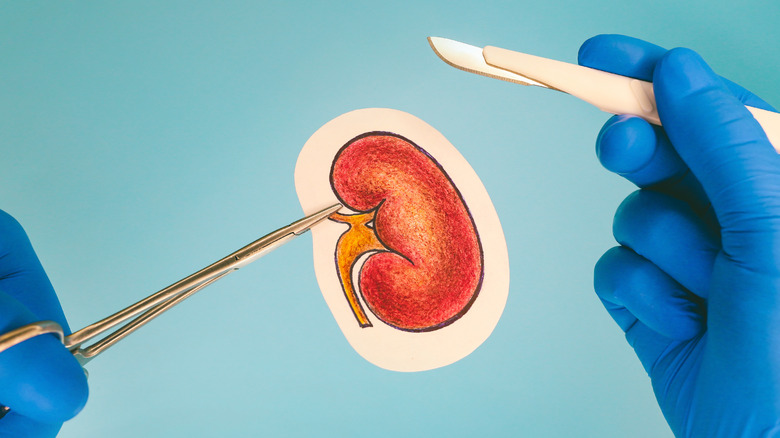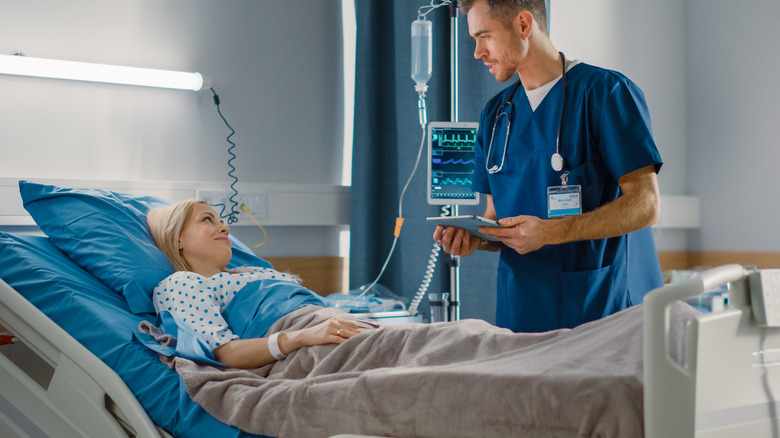The Reality Of Getting A Kidney Transplant
Our kidneys play a vital part in our overall health, and when they stop functioning as they should, a slew of health problems follow suit. These small but mighty organs are responsible for getting rid of excess fluids and waste in our bodies, and when they start to fail, these toxic compounds build up, leading to illness (via WebMD). People whose kidneys don't work as they should typically end up suffering from conditions like hypertension and kidney failure, according to the Mayo Clinic. Some people are more at risk for kidney failure because of preexisting chronic conditions like polycystic kidney disease, diabetes, untreated hypertension, and glomerulonephritis, which is a disease that inflames and scars the kidneys' filters.
People with failing kidneys need to receive dialysis to help rid their bodies of the toxins their kidneys aren't filtering. While this helps treat the problem, it's time-consuming and has a significant impact on their daily lives. This is where kidney transplants come in. While it's a pretty complicated surgery, survival rates after transplants tend to be higher than that of dialysis. Still, the decision is up to you — and it's always best to make a well-informed one. Read on for everything you need to know before getting a kidney transplant.
How to choose between staying on dialysis and getting a transplant
If your kidneys stop functioning as they should, you will typically be able to choose between sticking to dialysis or opting for a transplant. Understanding the difference between these two treatments is very important before you make a decision.
In an article that Serban Constantinescu, M.D., Ph.D., wrote for Temple Health, he explains that dialysis is often temporarily implemented until someone can receive a kidney from a donor. Basically, this process acts as your body's artificial kidney until you can get the real thing. He adds that many people find dialysis to be incredibly time-consuming. "Our patients sometimes find dialysis to be restrictive because appointments and maintenance take up a lot of time," Constantinescu writes, adding that it's important to keep in mind that, while dialysis is pretty effective, it isn't able to exactly replicate the function of your kidneys. You will constantly need to be monitored by your doctor to ensure your body is staying healthy while on dialysis. This can have a significant impact on the quality of your life, and Constantinescu says that this is one of the many reasons people opt for kidney transplants.
Once you had the surgery, you'll no longer be dependent on dialysis."With a kidney transplant, life is completely different. In my experience, it can help people get their lives back, and that's truly a gift," Constantinescu writes.
You can get a kidney from a living or deceased donor
It is possible to get a kidney from a living donor. This is because the body can function normally with just one kidney, according to the Mayo Clinic. Living donors can be family members, friends, or even complete strangers, according to the American Kidney Fund. Success rates for living donor kidney transplants are a whopping 98.11% while deceased donor success rates are 94.88%, according to the Scientific Registry of Transplant Recipients (via Temple Health).
Living-donor kidney transplants have various benefits associated with them. For starters, you won't have to sit on a waiting list for months on end, which means the chances of your health deteriorating while you wait is far less. Not having to wait to receive a kidney from a deceased donor also means that you might be able to avoid dialysis altogether. Your surgery can also be scheduled well ahead of time. With deceased donors, emergency surgery needs to be performed to ensure you get the transplant before the kidney expires. Those who get kidneys from living donors have also shown better survival rates — both short-term and long-term. There also aren't any additional risks associated with a living-donor transplant. They remain the same whether the donor is alive or deceased.
Who is an ideal candidate for a kidney transplant?
A kidney transplant surgery can be performed on patients of all ages, including children and elderly people, according to the National Kidney Foundation. Whether or not you're a good candidate for a kidney transplant depends on a myriad of factors.
Ideal candidates typically consist of people who have end-stage kidney disease and are completely dependent on dialysis. Patients who suffer from an advanced form of chronic kidney disease are also considered, according to the Cleveland Clinic. Even if you suffer from chronic kidney disease and also need another organ transplant, you'll still be considered for a kidney transplant. People who are typically seen as high-risk patients might also be good candidates, according to Temple Health. There is a catch, however: You'll have to undergo a complete medical evaluation to ensure you are healthy enough to receive and tolerate a new kidney.
There are, however instances where doctors will determine that a patient isn't a good candidate for a kidney transplant. Patients who suffer from infection or cancer typically aren't considered. If you have a short life expectancy or abuse alcohol or drugs, you won't get a transplant either. Sometimes doctors will determine that it isn't safe to operate on a patient, and in these cases, kidney transplants can't be performed (via the Cleveland Clinic). Your doctor will also evaluate whether the risks of the transplant may outweigh the benefits for your specific situation.
Preemptive versus early transplant
You might have heard of preemptive and early kidney transplants. The former refers to transplants that are performed before a patient's kidneys deteriorate to such an extent that they need dialysis. The latter refers to transplants performed shortly after kidney failure, and patients typically undergo dialysis for a short while before they get their transplant, according to the National Kidney Foundation.
Both these methods have various benefits and can be of great help when it comes to preserving a patient's health. The earlier you get a new kidney, the better, and research has shown that people who get transplants before needing dialysis (and those who are only on dialysis for a short time) show improved long-term health post-surgery. Not to mention, you'll save a ton in medical costs. For many, this transplant option offers them the chance to keep working and living their life without having to spend time going on dialysis and waiting for a kidney to become available. Your kidney disease will usually have far less of an impact on your everyday life if you opt for a preemptive or early transplant.
There are some risks to consider
Because you need surgery to get a new kidney, you'll face the same risks you would for any surgical procedure, which include infection, excessive bleeding, and respiratory issues. You also have to keep in mind that you'll be required to take medication after the procedure, which could cause some side effects. Since post-surgery meds are focused on suppressing your body's immune response to prevent it from rejecting the new kidney, you might be at a higher risk of getting infections, according to the Cleveland Clinic.
Your body rejecting the new kidney is another risk. Because it's not your own, the body could recognize it as a foreign object and proceed to try and get rid of it. Luckily, modern medical advances have found ways to prevent this from happening, and taking immunosuppressants is one way to keep your body from rejecting the new organ.
Aside from rejection, there are some other complications that could pop up after surgery, like bleeding and the development of blood clots. Your risk of suffering a heart attack or stroke might also be slightly higher after surgery, and the new kidney could pass on cancers and infections from the donor. Other risks include the development of a leak or blockage at the tube that connects your kidney to your bladder, as well as kidney failure. In some cases, kidney disease might recur even after you receive a transplant (via the Mayo Clinic).
Choosing a transplant center
Getting a kidney transplant can be daunting, and the best way to make sure the process goes as smoothly as possible is to choose a reputable transplant center. This in itself can be an overwhelming process, according to a 2019 study published in Clinical Transplant.
The study surveyed 82 kidney transplant patients to gauge how they handled choosing a transplant center and what factors influenced their decision. Most people appeared to have gone to a specific center because their doctor or a trusted friend recommended it. How long a transplant center has been in business was another deciding factor for many, while others chose centers based on convenience and familiarity. Participants also made a decision based on whether or not their insurance covered a specific center. These are definitely important factors to keep in mind. It's also crucial that you do your own research on nearby transplant centers and make a final decision based on that.
According to the Mayo Clinic, you do have the option to choose a different transplant center than the one your doctor recommended. Questions you can ask the center before you decide can include how many transplants they handle in a year, whether they have a variety of donation programs (this can have a big influence on how soon you get a kidney), and their survival rates. You can also check out the center's statistics and compare them to that of other centers by using the Scientific Registry of Transplant Recipients.
The matching process can take a while
You can't get just any kidney — it has to be compatible with your body. You will be required to undergo several tests to determine your compatibility with a donor's kidney, according to the Mayo Clinic. The donor's age, infection exposure, and kidney size can also play a role.
The first test you'll need to get is called blood typing. This helps doctors determine whether your blood type is a match for a donor's kidney. Incompatible blood types aren't necessarily an issue, but it does require additional medical treatment to ensure your body doesn't reject the kidney. If you and the donor's blood types are compatible, you'll undergo an additional test called tissue typing. This test looks at your genetic markers and compares them to the donor's. A good match means your body will be less likely to reject the kidney in the future.
Finally, doctors will do a crossmatch test to determine whether your blood's antibodies will react adversely to the donor's blood. If the crossmatch test is negative, it means your blood handled the donor's just fine, and the risk of your body rejecting the kidney is much lower. If the crossmatch is positive, the risk of rejection is higher. In some cases, doctors would still do the transplant, but again, you'll need additional medical treatment since the risk of your body rejecting the kidney will be much higher.
You'll have to pay close attention to your health before you get a transplant
In order for a kidney transplant to be successful, you have to be as healthy as possible, mentally and physically.
Watching what you eat is the first step to ensuring your body is ready to receive the transplant when the time comes, according to the NHS. If you're undergoing dialysis while waiting for a kidney, you'll have to avoid foods high in potassium, like bananas. You also need to watch your fluid intake. Staying at a healthy weight is also vital, as is limiting your alcohol intake and quitting cigarettes if you're a smoker. You should also make sure you take all your medication as prescribed and attend every dialysis session.
Other things you can do that will give your body a healthy boost before a transplant include doing moderate exercise and taking care of your mental health. Exercise will do wonders to boost your energy, while also helping you to destress. Try cycling, walking, or even swimming. Last but not least, try to do what you can to stay positive while you wait to receive a kidney. This will help you evade anxiety and depression. Staying busy with work or hobbies can help, as well as joining support groups where you can speak to people who are going through the same thing as you.
Here's what happens during surgery
Kidney transplant surgeries are pretty complex and take around three hours to perform, according to the NHS. Once you enter the operating room, the surgeon will place you under general anesthesia and get to work. They will either simply be placing the new kidney inside your body or remove your dead kidneys, depending on whether or not they are causing additional problems like infection or hypertension. If your kidneys are cancerous, they will be removed as well, according to the National Institute of Diabetes and Digestive and Kidney Diseases. The transplant site where the incision is made is typically around your lower abdomen, near the groin area.
The surgery consists of three stages. First, the incision will be made, after which the surgeon will position the new kidney. Then, they will attach the necessary blood vessels to the kidney to supply it with sufficient blood flow to start working. The last step of the surgery consists of reconnecting the tube that serves as a gateway for urine between the bladder and kidney (the ureter) to the new organ. Doctors might put a stent in your ureter to ensure urine can flow through easily. This is not permanent and will be extracted six to twelve weeks post-surgery. After the stent is in position, the surgeon will close the incision.
You'll have to take anti-rejection medication post-surgery
To ensure you have the best chance possible of avoiding kidney rejection, your doctor will prescribe immunosuppressant medication that you'll have to take post-surgery, according to the National Kidney Foundation. It's natural for our bodies to put up a fight against anything it doesn't recognize as part of itself, and a new kidney fits all the criteria. These drugs will work to reduce your immune system's activity. In turn, it won't start to attack the new kidney, preventing rejection. The only downside is that you'll have to take this medication for the rest of your life, or as long as the new kidney is functioning.
There are various types of immunosuppressants on the market, and new ones are constantly added to the list, according to Johns Hopkins Medicine. Your doctor will gauge which drug is best for you and will adjust it as needed. Typically, they will prescribe a combination of these drugs at first to figure out what works best for you. They might also adapt your dosage frequently depending on how your body responds.
Immunosuppressant medications can help you live a long, happy life with your new kidney, but they do have some side effects: You will be more susceptible to infections, especially when it comes to respiratory and oral infections. Your doctor will provide you with meds to help protect you from these conditions.
How does payment work for a kidney transplant?
If you have health insurance, it will cover the cost of your transplant. If you're with Medicare or the Federal Government health insurance program, your transplant-related costs will be covered for up to three years post-surgery.
If you receive a kidney from a living donor, Medicare will take care of their surgery and aftercare costs as well, according to the National Institute of Diabetes and Digestive and Kidney Diseases. It's important to note, however, that Medicare will not cover any costs related to travel, lodging, or the time the living donor had to take off work. If they need these costs covered, you can require assistance from the National Living Donor Assistance Program, according to the National Kidney Foundation.
Regarding the medication you need to take post-surgery, Medicare or your private insurance will typically help you carry the costs. If you can prove that you aren't able to afford these medications, some drug companies will provide you with a discount. Your transplant social worker can provide you with a list of companies that provide these discounts.
What can I expect post-surgery?
After your kidney transplant, you will be moved to the recovery room, then to the intensive care unit. You'll be monitored closely until you're stable enough to be moved to a regular nursing unit, where you will spend a few days while doctors make sure your new kidney is functioning as it should (via Johns Hopkins Medicine).
You'll initially get IV fluids until you're ready to consume solid food again. Doctors will keep track of your kidney's ability to produce urine by placing a catheter in your bladder. They'll also keep a close eye on how your body is responding to the immunosuppressant drugs. You'll also get regular blood tests to keep tabs on your new kidney, your lungs, your liver, and your blood system.
Before you are discharged, your transplant team will inform you of the steps you need to take once you're home to ensure you stay healthy.
What can I expect after I leave the hospital?
Most people start feeling like themselves again two weeks post-surgery, according to WebMD. However, you won't be able to lift heavy objects or drive until a month after surgery. Typically, transplant patients are required to take six to eight weeks off work to recover. You'll also have to pay your doctor a visit two to three times a week so they can monitor your kidney function and ensure your body is healing properly. These visits will lessen as you heal and your body adjusts.
Your doctor will also suggest that you start an exercise program to help you stay active. This will help your body recover from the surgery much faster. Ask your doctor what type of exercise they recommend. Typically, kidney transplant patients start off with gentle exercises like stretching and walking, and slowly increase the intensity as their body heals. Your doctor will also recommend you avoid smoking and drinking alcohol in order to keep your new kidney healthy.
How to notice rejection and how to prevent it
Kidney rejection can be tricky. Your doctor will be monitoring you for acute rejection after surgery. This happens when your body suddenly starts to attack the new kidney.
Quite often, acute rejection doesn't present any symptoms, and you're unaware that your body is attacking the new organ (via the National Kidney Foundation). However, some people do experience symptoms like fever, painful urination, urinating less frequently, feeling nauseous, and vomiting (via WebMD). You might also experience kidney pain, as well as weight gain and swelling.
The best way to prevent rejection is to call your doctor immediately if you experience any of the abovementioned symptoms. Showing up for all your post-surgery appointments (like blood tests) is also vital to monitor your new kidney's function and spot rejection early. It's also important to note that rejection can be remedied in some cases, and doesn't necessarily mean that you'll lose your new kidney.

